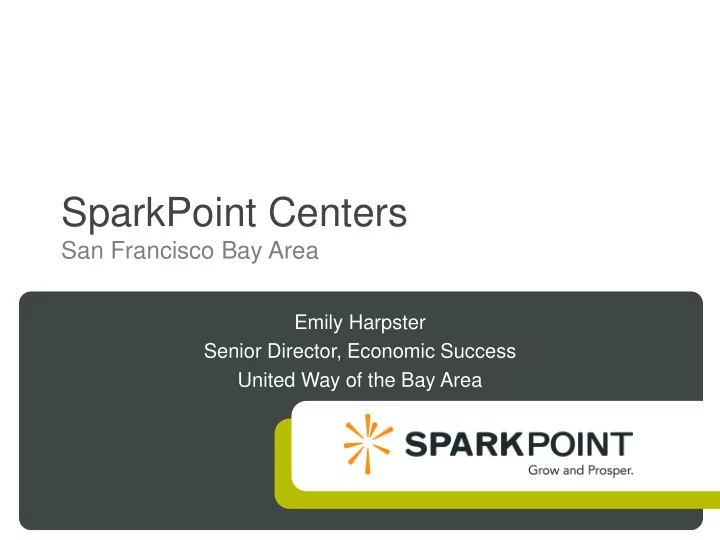

SparkPoint Centers San Francisco Bay Area Emily Harpster Senior Director, Economic Success United Way of the Bay Area
What is a SparkPoint Center? A SparkPoint Center brings together services from multiple organizations to help clients achieve financial stability.
What types of services are provided? 80+ partners come together to provide: • Financial coaching • Credit/debt counseling • Job coaching • Employment training • Benefits access • Tax preparation • First time homebuyer assistance ….and more. 3
What is our goal? Our goal is to help as many people as possible to achieve financial stability, defined as …
How Does it Work? Each SparkPoint client is offered a coach. Each coach works with clients to: • Create financial goals and a personal plan for financial stability • Navigate available resources • Hold clients accountable The coach acts from the belief that clients are • Be a partner/sounding board creative, resourceful, and whole • Provide tools to support clients address obstacles
How SparkPoint Can Help?
Results Matter • Over 16,000 served to date • In FY14: – Lots of clients made significant progress toward financial stability. • 78% of clients made 5%+ progress; 66% of clients made 30%+ progress on a key metric. – 70% of our clients took up more than one service . – We keep getting better at what we do. • 44% of clients got to the “finish line” on a key metric (compared to 34% last year). – Clients gave us good ratings. • Half of last year’s clients came back this year. 98% of clients said they would refer family or friends to SparkPoint.
Why we think it matters for employers • According to the CDC, “Companies that support workplace health have a greater percentage of employees at work every day.” SOURCE: http://www.cdc.gov/workplacehealthpromotion/businesscase/benefits/productivity.html • Workplace wellness programs often lead to a reduction in lost work time “equivalent to about 10.3 hours in additional productive time per year.” SOURCE: http://www.sciencedaily.com/releases/2013/10/131002131357.htm
Why we think it matters for employees • Poor families move twice as often, get evicted five times as much (Federman et al., 1996). • Children of poverty face 50 percent more street crossings with a six times greater risk in pedestrian accidents (McPherson et al., 1998). • Poor children have more contact with aggressive peers (Sinclair et al., 1994). • They experience more community violence; from an unsafe home neighborhood or a dangerous path to school which can hurt academic performance (Schwartz & Gorman, 2003). • Significantly more daily stresses--up to 35 percent more daily hassles and the toll on the body adds up (Attar et al., 1994) • Worse food choices because appetite and eating habits becomes altered by chronically higher levels of cortisol. (Cartwright, et al., 2003). SOURCE : http://thesciencenetwork.org/docs/BrainsRUs/Effetcs%20of%20Poverty_Jensen.pdf
How we want to engage with you • Provide services to support your employees • Explore further partnership opportunities – Partnering with you to support your recruitment and retention efforts – Engaging in a pilot project to test the benefits of financial wellness programming – Becoming part of a larger conversation about Bay Area workforce systems and services. We’re having an event in December with a small group of employers interested in exploring further partnership. If you are interested in attending, please let us know!
Contact Information Emily Harpster Senior Director, Economic Success CONTACT INFORMATION United Way of the Bay Area eharpster@uwba.org (415) 808-4333
Recommend
More recommend